Summary of High School Graduation Exam 2025, preparation for High School Graduation Exam 2026
On September 26, at Ton Duc Thang University (Ho Chi Minh City), the Ministry of Education and Training held a conference to summarize the organization of the 2025 High School Graduation Exam and prepare for the 2026 High School Graduation Exam.
Reporting on the evaluation of the organization of the 2025 High School Graduation Exam, Director of the Department of Quality Management Huynh Van Chuong commented: The exam was organized concisely, practically and effectively. The exam results ensured the set goals.
The first exam questions under the 2018 general education program closely followed the program's objectives, shifting from mainly assessing knowledge to assessing learners' abilities. The exam content was linked to practice, thereby encouraging innovation in teaching and learning methods in general schools, enhancing the educational significance and responsibility of students, schools, and society.
Regarding the expected organization of the 2026 High School Graduation Exam, Director of the Department of Quality Management Huynh Van Chuong said: The 2026 High School Graduation Exam is expected to be held on June 11 and 12, 2026 - earlier than previous years.
The 2026 exam will remain the same as in 2025 and is expected to have some adjustments to ensure compliance with the two-level local government management model, while continuing to apply information technology in the exam organization stages. The adjustments are expected to not affect candidates.
Specifically, amend regulations related to inspection and examination during the Exam to ensure compliance with the transfer of education inspection departments at all levels to the Government Inspectorate and Provincial Inspectorate.
Adjust some regulations and procedures for organizing exams to ensure more suitability and convenience for units in the context of restructuring provincial administrative units. Reduce the time for receiving appeal applications to announce the appeal results sooner and facilitate the enrollment work of higher education and vocational training institutions. Adjust the appeal marking process to increase efficiency and quality.
Regarding the roadmap for piloting the organization of the High School Graduation Exam on computers, according to Mr. Huynh Van Chuong, it is expected that in April-May 2026, the test questions on computers will be tested with a scale of about 100,000 candidates. It is expected that in July 2026, the Ministry of Education and Training will submit to the Government for consideration and promulgation of the Project on organizing the High School Graduation Exam on computers.
It is expected that in October-December 2026, the Ministry of Education and Training will issue procedures and regulations for computer-based exams. Localities will arrange a number of locations to pilot computer-based exams in 2027 and prepare to invest in facilities.
February-May 2027, organize testing of exam questions at locations planned to hold computer-based exams and organize large-scale testing of exam questions according to the question bank building process.
In June 2027, organize high school graduation exams on computers at qualified locations and organize high school graduation exams on paper at other locations.
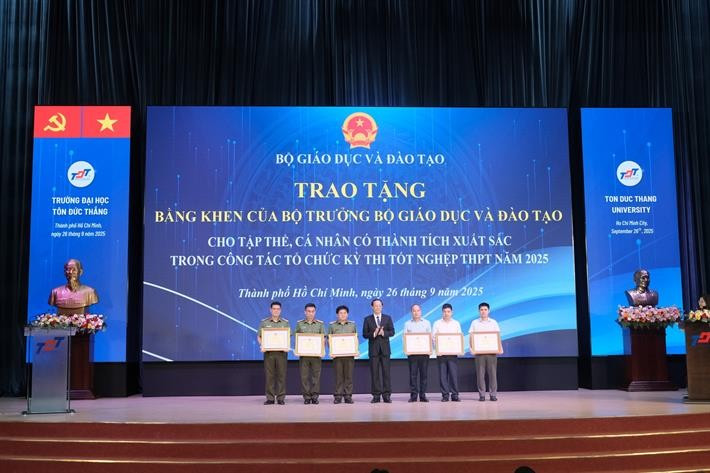
Speaking at the conference, Permanent Deputy Minister of Education and Training Pham Ngoc Thuong requested the Departments of Education and Training to direct from the beginning of the school year to strengthen formal teaching, pay attention to 12th grade students, focus on regular teaching and learning to ensure quality, and reduce pressure on students' exam preparation.
In addition, regular assessment and evaluation must be linked to final exams, including subject and room placement, and attention must be paid to students who need reinforcement, average and weak students.
For higher education institutions, the Deputy Minister suggested continuing to closely coordinate in arranging personnel to do the exam inspection work, and actively coordinate with the Ministry of Education and Training in the process of completing the plan to organize the high school graduation exam on computers in the coming period.
On this occasion, Deputy Minister Pham Ngoc Thuong awarded Certificates of Merit from the Minister of Education and Training to collectives and individuals with outstanding achievements in organizing the 2025 High School Graduation Exam.

Draft Resolution on breakthrough policies for education and training development
On September 25, the Ministry of Education and Training announced the draft Resolution of the National Assembly on a number of specific mechanisms and policies to make breakthroughs in education and training development. The draft proposes 6 key policy groups:
Firstly, the policy group on organization, human resources and administration (Article 3) is built to solve the human resource problem in the education sector, including the local shortage of teachers, inadequate remuneration and administrative barriers in recruiting and using talents and experts.
Second, the group of policies on programs, content and mechanisms for education development (Article 4 of the draft Resolution) is built to remove administrative procedures in the appraisal, approval and piloting of new education programs, creating space and motivation for innovation and creativity from the grassroots level, quickly responding to changes in practice.
Third, the policy group on digital transformation, science and technology development and innovation in education (Article 5 of the draft Resolution) aims to meet the requirements of the National Digital Transformation Program and the inevitable development trend of world education, overcoming the situation of digital infrastructure and application platforms in the industry being fragmented, lacking synchronization and not yet effective.
Fourth, the policy group on international integration in education and training (Article 6 of the draft Resolution) Breaking down administrative barriers, creating a truly open and competitive environment to attract global talent, enhancing the position and attractiveness of Vietnamese education in the international arena.
Fifth, the policy group on the National Scholarship Fund (Article 7) aims to create a flexible financial mechanism, supplementing the state budget, to finance innovative and breakthrough ideas and projects that the traditional budget mechanism finds difficult to respond to promptly and effectively.
The policy stipulates that the Fund will operate as an “investment fund” for educational initiatives, prioritizing funding for pilot projects to innovate programs, teaching methods, highly applicable educational scientific research, digital transformation projects and scholarships for young talents. With diverse capital sources from the budget, socialization and aid sources, the Fund will be an important financial lever, promoting creativity and innovation from the grassroots level.
Sixth, the group of policies on finance and investment in education and training (Article 8 of the draft Resolution) is built to address the situation of inadequate investment in education, prevent the decline in investment budget for higher education and increase the mobilization of social resources.
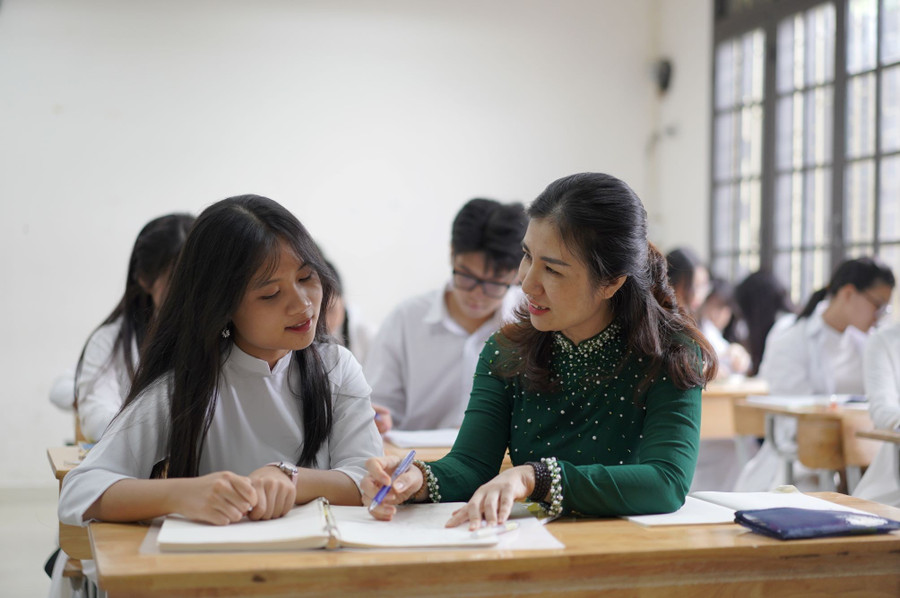
New policy for teachers
Last week, two documents related to teacher policies were published. Specifically as follows:
On September 23, the Ministry of Education and Training issued Circular No. 21/2025/TT-BGD&DT regulating the regime of paying overtime wages for teachers in public educational institutions (Circular No. 21).
The new circular removes the provisions on conditions for paying overtime wages in Clause 6, Article 3 of Joint Circular No. 07.
To ensure that teachers who teach extra hours are paid, to ensure fairness in the division of tasks among teachers in the same educational institution, and to ensure that overtime pay is consistent with the requirements of implementing the educational program, Circular No. 21 stipulates a number of binding conditions:
The total number of extra teaching hours in a school year of all teachers must not be higher than the maximum total number of extra teaching hours in a school year of the educational institution for which the educational institution is paid. In which, the maximum total number of extra teaching hours for which the educational institution is paid is the total number of hours required to implement all tasks minus the total number of standard hours of all teachers actually present. At the same time, the total number of extra teaching hours in a school year of each teacher must not exceed 200 hours.
The salary calculation formula is adjusted to match the current regulations; additional regulations on the responsibility for paying overtime wages for teachers on secondment or inter-school teaching; additional regulations on the time of paying overtime wages for teachers.
The new Circular also adds regulations on paying overtime wages to teachers who have not worked for a full school year; adds separate regulations for universities, colleges, training and fostering facilities of ministries, ministerial-level agencies, government agencies, and political schools of provinces and centrally run cities.

On September 24, the Ministry of Education and Training announced a draft Circular regulating the working regime for teachers at continuing education institutions (GDTX) and vocational education centers (GDTX), including: working time, annual leave, teaching period norms, reduction of teaching period norms and conversion of other activities into teaching periods.
Basically, the principle of determining the working regime of teachers of continuing education institutions ensures consistency with the regulations for general education and university preparatory teachers in Circular No. 05/2025/TT-BGD&DT. However, there is a difference in that teachers of continuing education institutions are not limited to 2 concurrent tasks due to the nature of their professional activities which are very different from those of general education teachers.
The draft Circular stipulates that the total number of reduced and converted periods for teachers' concurrent duties in 1 week must not exceed 50% of the average number of teaching periods in 1 week.
Teachers' summer vacation is implemented according to the rules and regulations of the vocational training institution, maximum 8 weeks, minimum 4 weeks. During the summer vacation, teachers participate in training and development according to the requirements of the job position, participate in high school graduation exams, enrollment, teach classes according to the training and development program, and educational activities of the center when summoned.
The draft Circular does not stipulate summer vacation time for directors and deputy directors as for principals and vice principals of general schools due to the nature of the center's work, which involves many educational and training activities during students' summer vacation.
However, allowing the center to arrange summer vacation time for teachers holding the position of educational institution management staff must be stipulated in the center's rules and regulations and must flexibly arrange summer vacation time to ensure that the center's activities take place normally and complete tasks assigned by competent authorities.
The draft Circular also stipulates a unified average teaching period per week for teachers teaching the GDTX program of 17 periods.
The regulations on the reduction of teaching hours and the conversion of professional activities into teaching hours are consistent with the regulations for general and pre-university teachers, and are consistent with the functions and tasks of the center. However, the draft Circular only regulates the regular part-time tasks and common professional activities of the center.
If there are additional tasks that require a reduction in the standard teaching hours or conversion, the director will base on the complexity and workload to estimate the number of converted teaching hours. This content must be agreed upon at the center's collective meeting. After reaching an agreement, the director will decide on the number of converted teaching hours for the task and report to the Department of Education and Training in writing...

Guidelines for school counseling and social work in schools
Last week, the Ministry of Education and Training also announced Circular No. 18/2025/TT-BGD&DT dated September 15, 2025 providing guidance on school counseling and social work in schools.
The Circular specifies the content of school counseling and social work in schools, including many important areas closely linked to the practical needs of learners.
Including consulting and support on learning issues (determining goals, building study plans; time management, choosing learning methods, etc.); on gender, social relationships (age psychology, gender, gender equality, reproductive health; friendship, love, marriage, family relationships, etc.); on psychology (prevention, screening, early detection; counseling, psychological consultation for learners with psychological difficulties); on life skills (cognitive skills, mastery, self-protection; skills to master emotional intelligence; interaction skills, social integration, etc.); on career guidance, employment, entrepreneurship; on policies, laws; on social work services for learners.
In terms of form, the Circular stipulates that school counseling and social work in schools can be carried out directly or online.
Educational institutions are responsible for establishing a system for receiving and exchanging information; coordinating with families, society, and relevant agencies to promptly receive information about situations and risks of learning difficulties, psychology, social relationships, or other difficulties of learners.
In addition, educational institutions can also organize communication activities and prevention programs; provide information on policies and laws; provide guidance on the use of school counseling and social work services; and organize activities to support the development of learners.
The Circular clearly defines responsibilities between levels, ensuring the synchronous participation of the political system and educational institutions.
The People's Committees at the provincial and communal levels are responsible for directing, arranging, allocating personnel, funding, and facilities, and at the same time developing a coordination mechanism and organizing inspection and supervision of the implementation of school counseling and social work in schools according to regulations.
The Department of Education and Training advises on the development and implementation of policies for school counselors and social workers in schools; develops coordination mechanisms; organizes training and capacity building for staff and inspects and evaluates implementation at educational institutions under its management.
For educational institutions, the head must be directly responsible for establishing a consulting team or department, arranging a consulting room, assigning full-time or part-time staff, developing an annual consulting work plan, and mobilizing legal resources for implementation. The head of the school is responsible for directing coordination between departments within the school, between the school and families and society, and at the same time creating conditions for staff and teachers to be trained and professionally developed...
Source: https://giaoducthoidai.vn/nong-trong-tuan-tong-ket-thi-tot-nghiep-thpt-chinh-sach-moi-cho-nha-giao-post750243.html


![[Photo] National Assembly Chairman Tran Thanh Man chairs the 8th Conference of full-time National Assembly deputies](https://vphoto.vietnam.vn/thumb/1200x675/vietnam/resource/IMAGE/2025/9/29/2c21459bc38d44ffaacd679ab9a0477c)
![[Photo] General Secretary To Lam chairs the meeting of the Central Steering Committee on preventing and combating corruption, waste and negativity](https://vphoto.vietnam.vn/thumb/1200x675/vietnam/resource/IMAGE/2025/9/29/fb2a8712315d4213a16322588c57b975)
![[Photo] Many streets in Hanoi were flooded due to the effects of storm Bualoi](https://vphoto.vietnam.vn/thumb/1200x675/vietnam/resource/IMAGE/2025/9/29/18b658aa0fa2495c927ade4bbe0096df)

![[Photo] General Secretary To Lam attends the ceremony to celebrate the 80th anniversary of the post and telecommunications sector and the 66th anniversary of the science and technology sector.](https://vphoto.vietnam.vn/thumb/1200x675/vietnam/resource/IMAGE/2025/9/29/8e86b39b8fe44121a2b14a031f4cef46)
![[Photo] General Secretary To Lam receives US Ambassador to Vietnam Marc Knapper](https://vphoto.vietnam.vn/thumb/1200x675/vietnam/resource/IMAGE/2025/9/29/c8fd0761aa184da7814aee57d87c49b3)


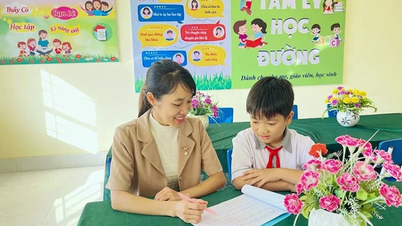
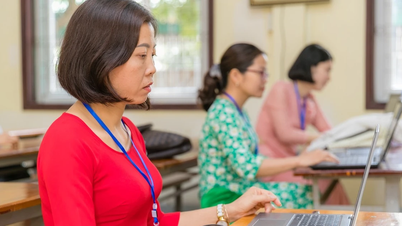


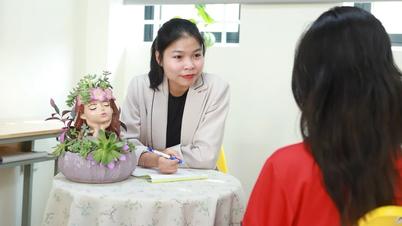


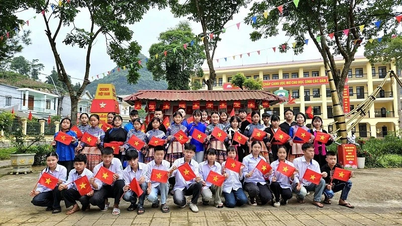

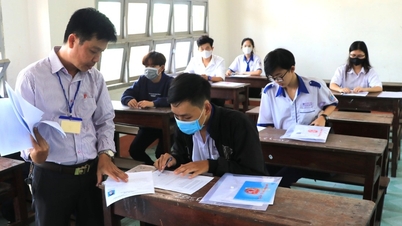
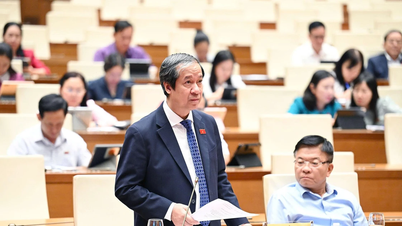



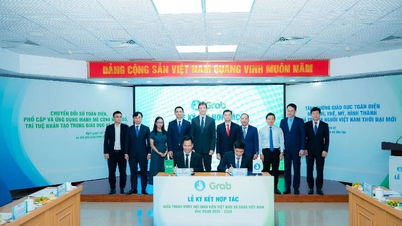





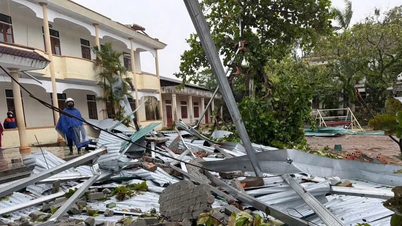
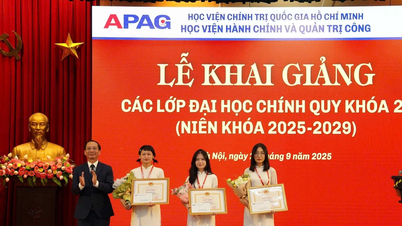

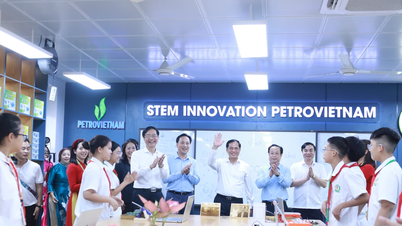
















































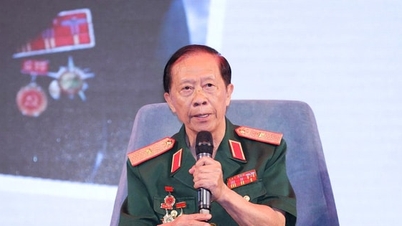






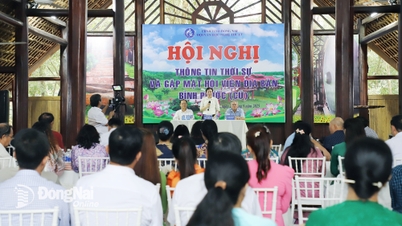













Comment (0)